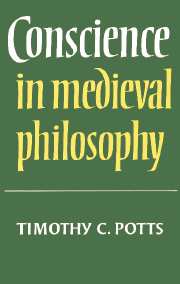Book contents
- Frontmatter
- Contents
- Preface
- Glossary
- 1 Peter Lombard and Jerome
- 2 Philip the Chancellor
- 3 Bonaventure
- 4 Aquinas
- 5 Balance-sheet
- TRANSLATIONS
- Notes on the translations
- Jerome, Commentary on Ezekiel 1.7
- Augustine, On the Trinity, book 12 (excerpts)
- Peter Lombard, Books of Judgements 2.39
- Philip the Chancellor, Summa de bono, treatise on conscience
- Bonaventure, Commentary on Peter Lombard's Books of ‘Judgements’ 2.39
- Aquinas, Debated Questions on Truth 16–17
- APPENDICES
- Bibliography
- Analytical index of subjects
- Index of proper names
- Index of Biblical references
Philip the Chancellor, Summa de bono, treatise on conscience
Published online by Cambridge University Press: 06 January 2010
- Frontmatter
- Contents
- Preface
- Glossary
- 1 Peter Lombard and Jerome
- 2 Philip the Chancellor
- 3 Bonaventure
- 4 Aquinas
- 5 Balance-sheet
- TRANSLATIONS
- Notes on the translations
- Jerome, Commentary on Ezekiel 1.7
- Augustine, On the Trinity, book 12 (excerpts)
- Peter Lombard, Books of Judgements 2.39
- Philip the Chancellor, Summa de bono, treatise on conscience
- Bonaventure, Commentary on Peter Lombard's Books of ‘Judgements’ 2.39
- Aquinas, Debated Questions on Truth 16–17
- APPENDICES
- Bibliography
- Analytical index of subjects
- Index of proper names
- Index of Biblical references
Summary
Almost nothing is known about the life of Philip the Chancellor. His title indicates that he was chancellor of the diocese of Paris. His work Summa de bono, written about 1230, has still not been printed, apart from some questions on the soul from the first part and the treatise on conscience translated here. It was, however, widely influential for about a century.
SUMMA DE BONO, Treatise on Conscience
(Latin text in O. Lottin, Psychologie et morale aux XIIe et XIIIe siècles, vol. 2. Gembloux, J. Duculot, 1948, pp. 140–142, 145–148, 150–152, 153–156; I have added the headings.)
About synderesis, which is called the spark of conscience, which was never extinguished in Cain, and whose job is to murmur back in answer to sin and to correct mistakes, as is said in Jerome's Commentary on Ezekiel, we now have to enquire:
is it a potentiality of the soul or some connatural disposition which is in the soul from the beginning?
if it is a potentiality, is it the higher or the lower part of reason, as Augustine divides the latter in On the Trinity and Peter Lombard repeats in the Judgements?
if there exists the power of sinning in respect of it, as in respect of free choice, whence has this arisen?
in what sense is it extinguished and in what sense not, and in respect of what?
- Type
- Chapter
- Information
- Conscience in Medieval Philosophy , pp. 94 - 109Publisher: Cambridge University PressPrint publication year: 1980



